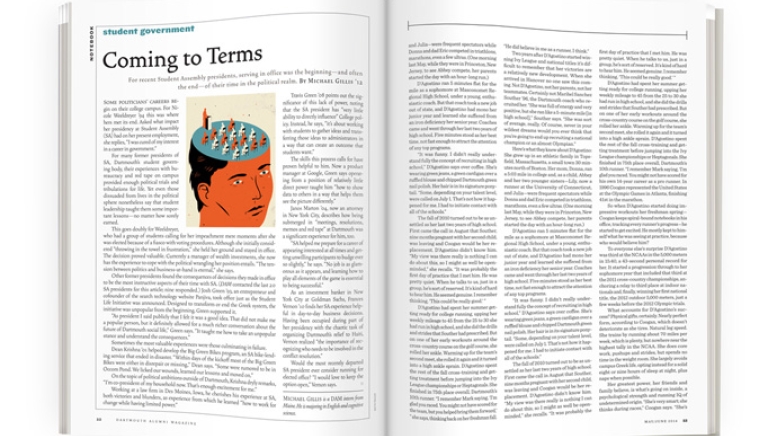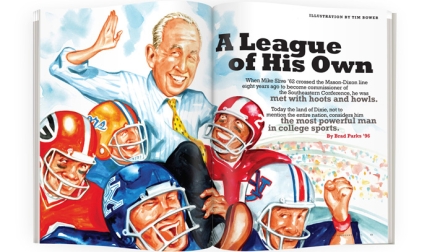Some politicians’ careers begin on their college campus. For Nicole Weeldreyer ’94 this was where hers met its end. Asked what impact her presidency at Student Assembly (SA) had on her present employment, she replies, “I was cured of my interest in a career in government.”
For many former presidents of SA, Dartmouth’s student governing body, their experiences with bureaucracy and red tape on campus provided enough political trials and tribulations for life. Yet even those dissuaded from lives in the political sphere nonetheless say that student leadership taught them some important lessons—no matter how sorely earned.
This goes doubly for Weeldreyer, who had a group of students calling for her impeachment mere moments after she was elected because of a fiasco with voting procedures. Although she initially considered “throwing in the towel in frustration,” she held her ground and stayed in office. The decision proved valuable. Currently a manager of wealth investments, she now has the experience to cope with the political wrangling her position entails. “The tension between politics and business-at-hand is eternal,” she says.
Other former presidents found the consequences of decisions they made in office to be the most instructive aspects of their time with SA. (DAM contacted the last 20 SA presidents for this article; nine responded.) Josh Green ’93, an entrepreneur and cofounder of the search technology website Panjiva, took office just as the Student Life Initiative was announced. Designed to transform or end the Greek system, the initiative was unpopular from the beginning. Green supported it.
“As president I said publicly that I felt it was a good idea. That did not make me a popular person, but it definitely allowed for a much richer conversation about the future of Dartmouth social life,” Green says. “It taught me how to take an unpopular stance and understand the consequences.”
Sometimes the most valuable experiences were those culminating in failure.
Dean Krishna ’01 helped develop the Big Green Bikes program, an SA bike-lending service that ended in disaster. “Within days of the kickoff most of the Big Green Bikes were either in disrepair or missing,” Dean says. “Some were rumored to be in Occom Pond. We licked our wounds, learned our lessons and moved on.”
On the topic of political ambitions outside of Dartmouth, Krishna dryly remarks, “I’m co-president of my household now. That’s enough excitement for me.”
Working at a law firm in Des Moines, Iowa, he cherishes his experience at SA, both victories and blunders, as experience from which he learned “how to work for change while having limited power.”
Travis Green ’08 points out the significance of this lack of power, noting that the SA president has “very little ability to directly influence” College policy. Instead, he says, “it’s about working with students to gather ideas and transferring those ideas to administrators in a way that can create an outcome that students want.”
The skills this process calls for have proven helpful to him. Now a product manager at Google, Green says operating from a position of relatively little direct power taught him “how to show data to others in a way that helps them see the picture differently.”
Janos Marton ’04, now an attorney in New York City, describes how being submerged in “meetings, resolutions, memos and red tape” at Dartmouth was a significant experience for him, too.
“SA helped me prepare for a career of appearing interested at all times and getting unwilling participants to budge ever so slightly,” he says. “No job is as glamorous as it appears, and learning how to play all elements of the game is essential to being successful.”
As an investment banker in New York City at Goldman Sachs, Frances Vernon ’10 finds her SA experience helpful in day-to-day business decisions. Having been occupied during part of her presidency with the chaotic task of organizing Dartmouth’s relief to Haiti, Vernon realized “the importance of recognizing who needs to be involved in the conflict resolution.”
Would the most recently departed SA president ever consider running for elected office? “I would love to keep the option open,” Vernon says.
Michael Gillis is a DAM intern from Maine. He is majoring in English and cognitive science.




